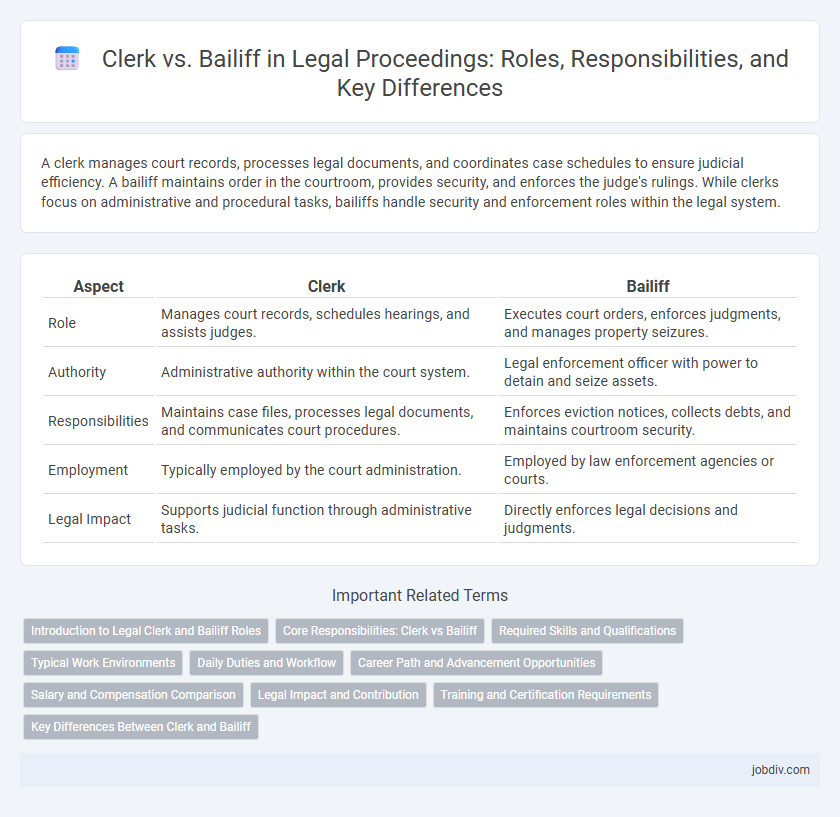A clerk manages court records, processes legal documents, and coordinates case schedules to ensure judicial efficiency. A bailiff maintains order in the courtroom, provides security, and enforces the judge's rulings. While clerks focus on administrative and procedural tasks, bailiffs handle security and enforcement roles within the legal system.
Table of Comparison
| Aspect | Clerk | Bailiff |
|---|---|---|
| Role | Manages court records, schedules hearings, and assists judges. | Executes court orders, enforces judgments, and manages property seizures. |
| Authority | Administrative authority within the court system. | Legal enforcement officer with power to detain and seize assets. |
| Responsibilities | Maintains case files, processes legal documents, and communicates court procedures. | Enforces eviction notices, collects debts, and maintains courtroom security. |
| Employment | Typically employed by the court administration. | Employed by law enforcement agencies or courts. |
| Legal Impact | Supports judicial function through administrative tasks. | Directly enforces legal decisions and judgments. |
Introduction to Legal Clerk and Bailiff Roles
Legal clerks manage documentation, draft legal correspondence, and assist attorneys with case preparation, ensuring procedural accuracy and efficient office operations. Bailiffs maintain courtroom order, enforce court rules, and provide security during legal proceedings. Both roles are essential for smooth judicial processes, supporting different facets of court administration.
Core Responsibilities: Clerk vs Bailiff
Clerk core responsibilities include managing court records, scheduling hearings, and maintaining official documentation to ensure accurate legal proceedings. Bailiffs focus on courtroom security, enforcing order, and managing the safety of all participants during trials. Both roles are crucial to the efficient operation of the judicial system but serve distinct functions within court administration.
Required Skills and Qualifications
Clerks require strong organizational skills, attention to detail, and proficiency in legal terminology and document management, often holding a paralegal certificate or a degree in legal studies. Bailiffs must possess excellent communication skills, physical stamina, and knowledge of courtroom procedures, commonly requiring certification from a recognized law enforcement or court security training program. Both roles demand a thorough understanding of legal protocols and the ability to maintain professionalism in high-pressure environments.
Typical Work Environments
Clerks typically work in judicial offices, courthouses, or law firms, managing case files, scheduling hearings, and supporting judges by organizing legal documents. Bailiffs operate primarily within courtrooms, tasked with maintaining order during trials, ensuring the security of the premises, and escorting witnesses or defendants as needed. Both roles require close interaction with the judicial system but differ significantly in their daily environments and responsibilities.
Daily Duties and Workflow
Clerks manage court records, schedule hearings, and handle administrative tasks ensuring smooth courtroom operations. Bailiffs maintain courtroom security, enforce order, and assist judges by escorting defendants and managing evidence. Both roles are essential for efficient court workflow, with clerks focusing on documentation and bailiffs on security.
Career Path and Advancement Opportunities
Clerks typically begin their careers with entry-level roles involving administrative tasks in courts or law offices, advancing to supervisory or specialized positions such as court clerk supervisors or legal secretaries. Bailiffs often start as security officers or law enforcement aides within judicial settings, progressing to senior bailiff roles or lateral moves into probation or correctional officer positions. Both career paths offer opportunities for professional development through certifications and experience, with clerks focusing more on legal procedures and bailiffs emphasizing courtroom security and enforcement.
Salary and Compensation Comparison
Clerks in the legal field typically earn an average annual salary ranging from $40,000 to $60,000, with compensation varying based on jurisdiction and experience. Bailiffs generally receive a comparable salary, often between $35,000 and $55,000 per year, though their pay may include additional benefits such as hazard pay or overtime due to the nature of their duties. Both positions may receive health insurance, retirement plans, and paid leave, but clerks often have higher earning potential with advancement into specialized legal roles.
Legal Impact and Contribution
Clerks facilitate court proceedings by managing case records, documenting legal transactions, and ensuring procedural compliance, which directly impacts the efficiency and accuracy of judicial processes. Bailiffs maintain courtroom security, enforce court orders, and manage jury conduct, contributing to the integrity and authority of the legal environment. Both roles are essential in sustaining the rule of law, with clerks supporting administrative precision and bailiffs upholding enforcement and order within the judiciary.
Training and Certification Requirements
Clerks typically require formal education in paralegal studies or criminal justice, often holding certifications such as the Certified Court Clerk (CCC) credential to validate their expertise. Bailiffs need specialized training in courtroom security, self-defense, and legal procedures, usually completed through law enforcement academy programs or certification courses like the Court Security Officer Certification. Both roles mandate ongoing education to stay updated with legal regulations and court protocols, ensuring professional compliance and operational competence.
Key Differences Between Clerk and Bailiff
A clerk primarily manages court records, schedules hearings, and handles administrative tasks, ensuring the smooth operation of the judicial process. A bailiff is responsible for maintaining courtroom security, enforcing order, and assisting the judge by managing juries and witnesses. The key difference lies in their roles: clerks focus on administrative and procedural duties, while bailiffs focus on security and order enforcement within the courtroom.
Clerk vs Bailiff Infographic

 jobdiv.com
jobdiv.com